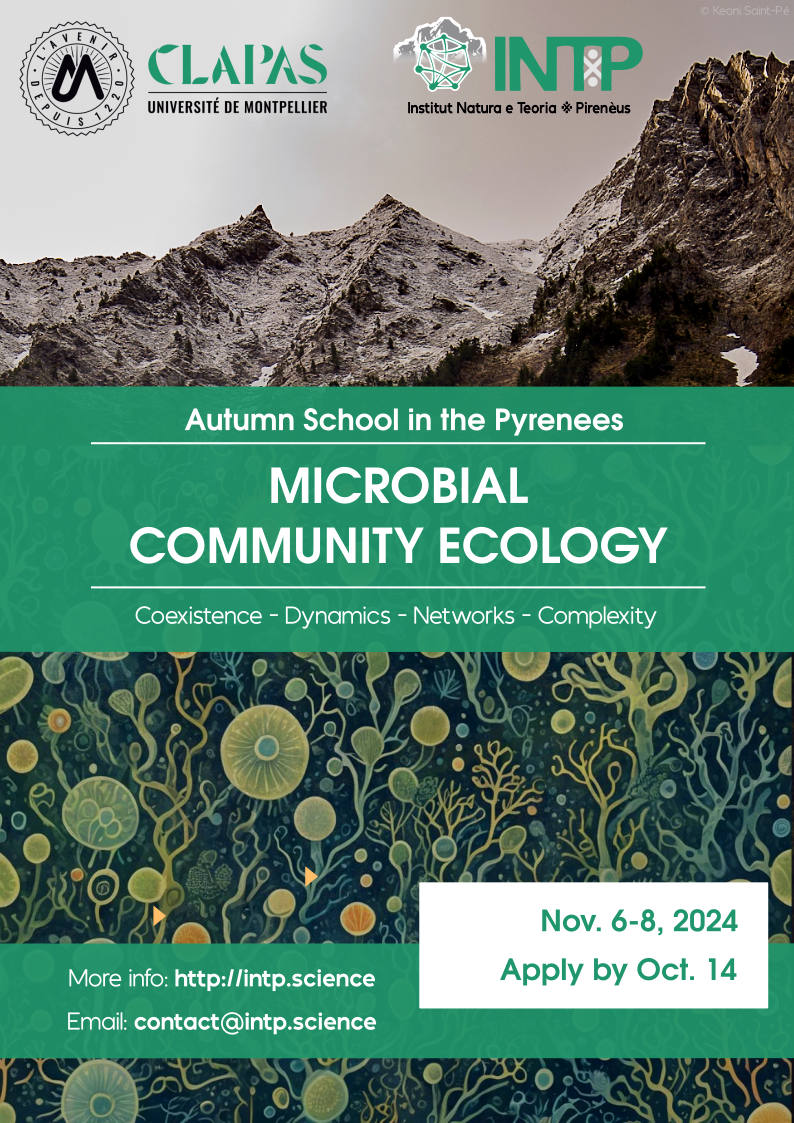
Microbiomes are not just indicators of the state of their environment or the health of their host. They are ecosystems in their own right, shaped by similar forces and dynamics as those studied by ecologists in forests, islands or oceans.
This 3-day school in Microbial Community Ecology aims to give an overview of the key concepts and tools from community ecology (from coexistence to complex networks), that can enrich the way we think about and study microbiomes, plan experiments and analyze data.
Please fill out this form before October 14, 2024. If too few people register, this session will be delayed to 2025.
The program includes lectures in the morning, practicals in the afternoon and free time for outdoors activities in the Pyrenees (including optional guided mountaineering activities, see below).
Application deadline: October 14, 2024
Dates: Wednesday November 6, 9:00 to Friday November 8, 16:00 (arrival from Tuesday 5, 18:00)
Location: The school will take place at the INTP campus in Surba, a small village in the French Pyrenees, accessible by train from Toulouse (nearest station : Tarascon-sur-Ariège).
All fees will be covered by the CLAPAS Key Initiative for selected applicants from associated laboratories, including tuition, accommodation and travel costs.
The school is mainly intended for graduate students and young post-doctoral fellows working on microbial communities and host-associated microbiomes from the laboratories that are part of the CLAPAS Key Initiative.
Our aim is to help build a common language and a community through exchanges between participants working on diverse applications such as animal health, plants and agrosystems, and even human health. We will offer a panorama of how the principles and theories of community ecology can inform their scientific questions, experiments, data analysis, or teaching.
Applicants should fill out this form and submit the following documents by email to contact@intp.science
A current academic CV
A short cover letter (1 paragraph to 1 page) summarizing their relevant background and interest in the school.
Lecturers: Matthieu Barbier (CIRAD), Azenor Bideault (U Laval).
Arrival possible on November 5 after 6pm.
Wednesday 6
9:00-12:30 Lectures: Introduction + Biodiversity and coexistence theory
14:00-17:00 Free time & optional outdoors activities
17:00-19:30 Practicals: Analyzing experimental data from small synthetic microbial communities
Thursday 7
9:00-12:30 Lectures: Functional roles + Ecological networks
14:00-17:00 Free time & optional outdoors activities
17:00-19:30 Practicals: Mathematical models and statistical methods
Friday 8
9:00-12:30 Lectures: Complexity, stochasticity and historicity + Conclusions
14:00-16:00 Practicals: Macroecological patterns in microbiome diversity, composition and functioning
16:00-20:00 Free time & optional outdoors activities, departure
A local guide will offer mountaineering activities for an extra fee: rock climbing & via ferrata. These planned activities will happen if enough participants register in advance.
Extra fees: 50 euros / 1 activity, 90 euros / 2 activities.
Alternatively, we will help participants plan other activities (hiking, visiting prehistoric caves or neighboring cities, etc.)